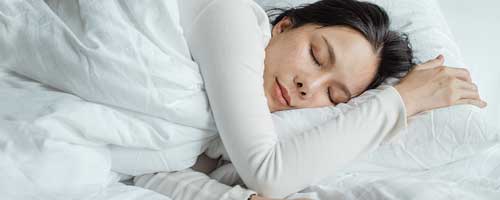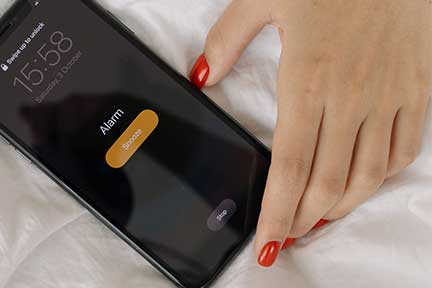Can too much sleep be bad for you? 4 reasons to not hit that snooze button tomorrow morning

We usually hear from people who aren't getting enough sleep and use SleepPhones® headphones as a solution for a better night's rest. As many of our readers know, too little sleep can have harmful consequences, such as feeling tired all the time, lower mental alertness and a negative attitude. But did you know that too much sleep can be bad for you too?
While it may feel good to hit that snooze button or sleep in on the weekends, there are side effects of sleeping too much that include a decline in mood, physical and mental activity and health. It could even lead to premature death.
Here are ways that too much sleep can make a harmful impact.
It can slow down your brain.

A 2011 study by University of London researchers found that you can age your brain by up to seven years by getting to much (or too little) sleep. Mental and physical decline can be noticed in testing, vocabulary, memory, reasoning and more for those who sleep more than eight hours. Students in college and high school are especially at risk for this, as sleep becomes more appealing as students are often busy with work, studies, and extracurricular activities. Putting in long hours of studying at night and sleeping in through the late morning and afternoon can affect how much your mind processes and how you might perform on a test. Creating a consistent morning and nighttime routine at an early age can help you avoid sleeping too much.
It could make you more tired.
Sleeping too much can leave you feeling less rested and more tired. Because your body is trying to compensate poor quality sleep with larger quantity sleep, you may feel less energized. Quality over quantity is the key here.
It could make you sick.
Health and sleep have been strongly correlated for a long time. This article from WebMD shows that there can be physically detrimental side effects to oversleeping. Too much sleep can be linked to diabetes, heart disease, weight gain/obesity and depression. If you are allowing yourself to be in bed for long hours, you are also allowing your body to become weaker. The inactivity of sleeping may easily lead to weight gain because your body is not actively digesting or moving around as quickly as it does when you are awake. Remaining inactive in this way makes you more susceptible to illness and quite possibly the life-altering diseases mentioned above.
Researchers noted that other factors such as depression and low socioeconomic status could lead to oversleeping caused by undiagnosed health issues, so the direct correlation could instead be reversed in many cases.
It could cause you to die younger.
According to WebMD, researchers have found that eight or more hours sleep a night could shorten your life. The study included more than 1 million participants and found that those who slept eight hours or more each night died younger. They note that this cannot be fully explained but that there is a strong association.
So before you hit the snooze button again, think about how you might feel later on during the day or the next day. It is easy to listen to our bodies if they feel heavy and tired, but allow the mind to wake up the body and get moving. Practice good nighttime and morning routines, lead a healthy lifestyle and use your SleepPhones® headphones to ensure you get get better quality sleep, so you can wake up feeling well rested and not need those extra hours of slumber.
